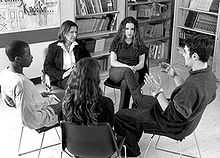Psychology/Lecture
< Psychology
Psychology is a scientific study of the human mind and its functions, especially those affecting behavior in a given context. It can refer to the mental characteristics or attitude of a person or group, or the mental and emotional factors governing a situation or activity.
Theoretical psychology
Def. the "study of
- the human mind, [...]
- human behavior, [...]
- animal behavior, or [the]
- mental, emotional, and behavioral characteristics pertaining to a specified person, group, or activity"
is called psychology.
Emotions


An emotion is a natural instinctive state of mind deriving from one's circumstances, mood, or relationships with others. It is any of the particular feelings that characterize such a state of mind, such as joy, anger, love, hate, horror, etc.
Abnormal psychology
Def. the "academic study of persons whose psychological characteristics deviate from the norm,[1] as with neuroses, psychoses, and disorders"[2] is called abnormal psychology.
"Unlike members of other oppressed groups (eg, African Americans, immigrants), most LGBs have siblings who are members of the dominant group (heterosexuals)."[3]
Applied psychology
The basic premise of applied psychology is the use of psychological principles and theories to overcome practical problems in other fields, such as business management, product design, ergonomics, nutrition, law and clinical medicine. Applied psychology includes the areas of industrial/organizational psychology, human factors, forensic psychology, engineering psychology, as well as many other areas.
The legend and founder of applied psychology was Hugo Munsterberg. The German man came to America originally studying philosophy similar to most aspiring psychologists during the late 1800’s. Munsterberg had many interests in the field of psychology such as, purposive psychology, social psychology and forensic psychology. In 1907 he wrote several magazine articles concerning legal aspects of testimony, confessions and courtroom procedures, which eventually developed into his book, On the Witness Stand. The following year the Division of Applied Psychology was adjoined to the Harvard Psychological Laboratory. Within 9 years he had contributed eight books in English, applying psychology to education, industrial efficiency, business and teaching. Eventually Hugo Munsterberg and his contributions would define him as the creator of Applied Psychology.
Engineering psychology is an interdisciplinary part of Ergonomics and studies the relationships of people to machines, with the intent of improving such relationships. This may involve redesigning equipment, changing the way people use machines, or changing the location in which the work takes place. Often, the work of an engineering psychologist is described as making the relationship more "user-friendly."
Engineering psychology is an applied field of psychology concerned with psychological factors in the design and use of equipment. Human factors are broader than engineering psychology, which is focused specifically on designing systems that accommodate the information-processing capabilities of the brain.
Clinical psychology

Def. a "branch of psychology with purpose of understanding, preventing, and relieving psychologically based distress or dysfunction and to promote subjective well-being and personal development"[4] is called clinical psychology.
Social psychology
Def.
- the "interplay between the individual and society"[5] and
- the "study of how people and groups interact"[5]
is called social psychology.
From a social-psychological point-of-view "[A] group is dominant if it possesses a disproportionate share of societal resources, privileges, and power."[6]
"Based on the ethnic preference and trait attribution techniques, a remarkably consistent set of findings emerged, especially in relation to dominant group children."[7]
Psychiatry
Def. a "branch of medicine that [subjectively] diagnoses, treats, and studies mental illness and behavioural conditions"[8] is called psychiatry.
Psychopathology
Psychopathology is a term which refers to either the study of mental illness or mental distress, or the manifestation of behaviors and experiences which may be indicative of mental illness or psychological impairment.
Psychosis

Psychosis is a severe mental disorder in which thought and emotions are so impaired that contact is lost with external reality.
Original research
- See also: Original research inquiry and Research
Hypothesis:
- Like art, the focuses of psychology are those of its dominant groups.
- See also: Control groups and Proof of concept
See also
References
- ↑ BD2412 (6 April 2007). "abnormal psychology, In: Wiktionary". San Francisco, California: Wikimedia Foundation, Inc. Retrieved 2015-08-09.
- ↑ "abnormal psychology, In: Wiktionary". San Francisco, California: Wikimedia Foundation, Inc. 28 July 2015. Retrieved 2015-08-09.
- ↑ Kimberly F. Balsam, Theodore P. Beauchaine, Ruth M. Mickey, Esther D. Rothblum (August 2005). "Mental Health of Lesbian, Gay, Bisexual, and Heterosexual Siblings: Effects of Gender, Sexual Orientation, and Family". Journal of Abnormal Psychology 114 (3): 471-6. doi:10.1037/0021-843X.114.3.471. http://psycnet.apa.org/journals/abn/114/3/471/. Retrieved 2012-01-07.
- ↑ Sinek (12 August 2010). "clinical psychology, In: Wiktionary". San Francisco, California: Wikimedia Foundation, Inc. Retrieved 2015-08-09.
- 1 2 Meco (30 May 2015). "social psychology, In: Wiktionary". San Francisco, California: Wikimedia Foundation, Inc. Retrieved 2015-08-09.
- ↑ Eric D. Knowles, Kaiping Peng (August 2005). "White selves: conceptualizing and measuring a dominant-group identity". Journal of Personality and Social Psychology 89 (2): 223-41. doi:10.1037/0022-3514.89.2.223.
- ↑ Drew Nesdale (March 2001). "Language and the Development of Children’s Ethnic Prejudice". Journal of Language and Social Psychology 20 (1-2): 90-110. doi:10.1177/0261927X01020001005. http://jls.sagepub.com/content/20/1-2/90.short. Retrieved 2012-01-07.
- ↑ Joel7687 (12 August 2005). "psychiatry, In: Wiktionary". San Francisco, California: Wikimedia Foundation, Inc. Retrieved 2015-08-08.
External links
| |||||||||||||||||||||||||||||||||||||||||||||||||||||
| |||||||||||||||||||||||||||||||||||||||||||||||||||||
![]() This is a research project at http://en.wikiversity.org
This is a research project at http://en.wikiversity.org
| |
Development status: this resource is experimental in nature. |
| |
Educational level: this is a research resource. |
| |
Resource type: this resource is an article. |
| |
Resource type: this resource contains a lecture or lecture notes. |
| |
Subject classification: this is a psychology resource . |